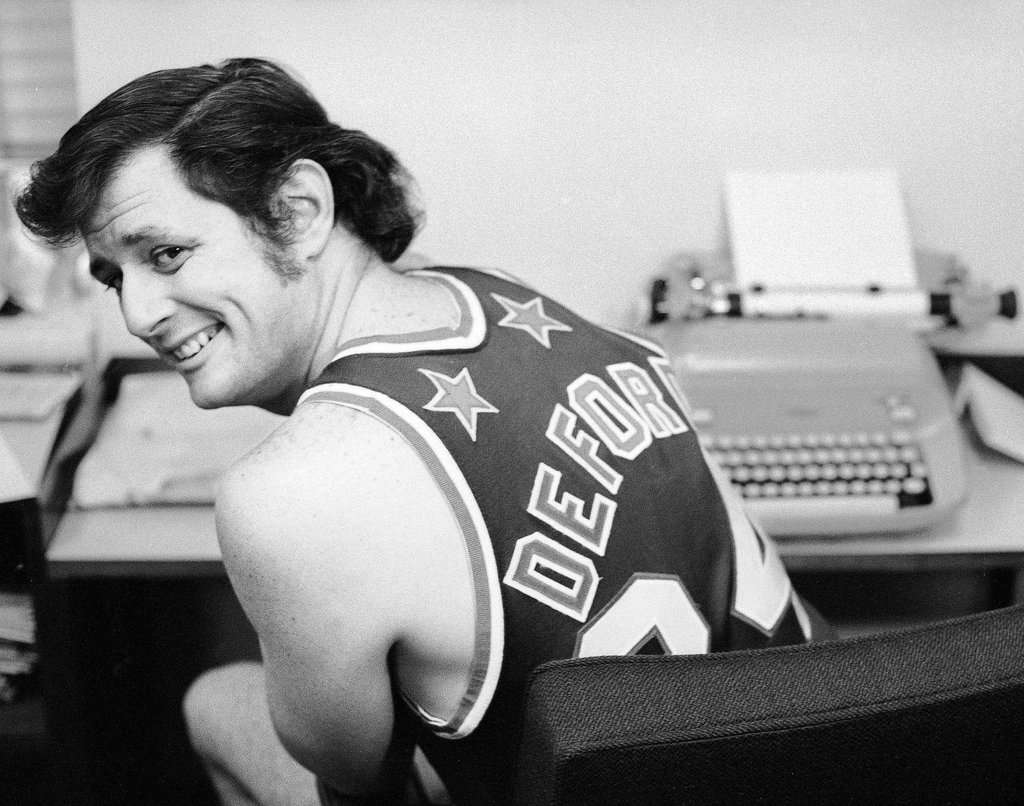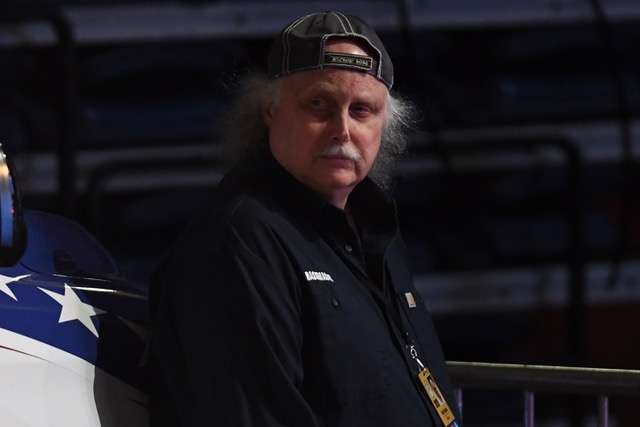
Dateline: Dining room table
– Frank Deford
AKA Benjamin Franklin Deford III
6 Time Sportswriter of the Year
2 Time Magazine Writer of the Year
Member of the Sportscasters and Sportswriters Hall Of Fame
I was sitting in a leather chair in Frank’s Westport, Conn. home, he was behind his big wooden desk pounding on an old manual typewriter, when he finished a page he would grasp the top, pull it out with the motion a medieval knight would use to pull his sword from its sheath and then Frank would toss it so that it gently landed on the corner of the desk where I would reach over, pick it up, and read it.
Between each page, we would talk.
Talk of sports, talk of literature, talk of combining the two. Even way back in 1993, and I’m sure probably before that, he was concerned, that may be too strong of a word, but he gave much thought to how sports were being covered “…by the written word.”
We talked of some of the greats of the biz, I kept up with him on Hemingway and Plimpton, he lost me when he mentioned W.C. Heinz, Grantland Rice and Red Smith. “Go to a bookstore, you’ll see.”
And I did.
And I did.
Several years later as I left an interview to work at HBO Real Sports in Manhattan I headed to Grand Central Station and hopped on the Metro North train to head back home to Connecticut and as I was sitting in a rare semi-empty train car in I heard a voice behind me say, “Mind if I sit with you.”
Yeah, I did, since most of the seats were vacant but when I turned around I saw towering over me, Frank Deford.
Sitting he started talking about the stories he read of mine on ESPNPage2.com, and he welcomed me to storytelling, “Tell them the story of the sport not the score, db, chances are they already know the score. Tell them the story of the game.”
Frank got off a couple stops before I did and as soon as he left I dug in my briefcase for a pen and paper and wrote that quote down from him, and this one, the last thing he ever said to me in person:
“Whatever sport you write about, db, make me love a sport I’ve never seen or played.”
A couple days ago, Frank passed away in Key West, he was 78.
He was a storyteller of sports.
And a writing hero of mine.
“The joy sometimes is in the simple beauty.”
– Frank Deford
Frank’s passing and me being isolated at home and looking at the sport, at the game, at the way we cover it, quite frankly, has me questioning myself about the state of what we do, how we do it, and sports writing in general.
Years back, ESPN was tearing up our newsroom to make it bigger, or fancier, I forgot what the reason was, it happened every couple of years or so, but as the room was being cleared one lonely figure sat amongst the empty desks and just watched.
I saw him, he waved and I went over and sat on the desk and we talked awhile, talked about a column of his I was working on, talked of writing and sports. “You know what I hate?”
I didn’t, I knew he hated a bunch of things but couldn’t think quick enough to narrow it down.
“Labels suck, why do they have to put the word ‘sports’ before the word ‘writer?’ You’re a producer; why do you have to do that?”
I didn’t say anything, I’ve learned that when he was on a rant best to let him go. “I’m a writer, you’re a writer, that’s all they have to say, putting a word before that just limits what I write about to that word, screw that.”
And then Hunter S. Thompson brushed back the cape he was wearing and tapped the printout of his column I had in my hand with his cane and said, “I’m just a writer man, just telling stories.”
That’s the root of the questioning crisis I face having now been removed from the day to day deadlines, the cross country travel, the pounding of the weather, the early mornings and the late nights of covering this gig, sitting thousands of miles away with a chance to breathe one thought keeps blasting over and over in my mind.
Have I missed the STORY of this game.
Have I made one person who never knew of the sport, love it.
After knowing and learning from Frank, from Hunter and from a couple others, have I failed this whole damn thing.
Both, I think, could make that point.
Read how W.C. Heinz writes about one round of basically a nothing boxing match:
“The night Bummy fought Fritzie Zivic in the Garden and Zivic started giving him the business and Bummy hit Zivic low maybe thirty times and kicked the referee, they wanted to hang him for it.” – W. C. Heinz
I’m not a fan of boxing, but trust me, I would read on after that.
Or Red Smith, read how he describes Dizzy Dean:
“As a ballplayer, (Dizzy) Dean was a natural phenomenon, like the Grand Canyon or the Great Barrier Reef. Nobody ever taught him baseball and he never had to learn. He was just doing what came naturally when a scout named Don Curtis discovered him on a Texas sandlot and gave him his first contract.” – Red Smith
Neither one of those are “Sports writing.”
Both of those are…writing.
When I read writing like that, I know I have to elevate my game, for this game.
I do know this, our greatest asset, those of us who “cover” this sport is the story of the game, story over score, the story of those who play it, the story of where it is played, the story of why we pick up rods and reels and cast into the darkness of the water for the treasure that lies within.
“The purpose of a storyteller is not to tell you how to think, but to give you questions to think upon.”
– Brandon Sanderson
With the passing of a great one in our biz of writing stuff for people to read it should give the not so great, us, a time to reflect on the gift given to us in passing and how we should carry the torch forward.
What, in fact, have we done with this gift:
— The Old Man and the Sea
Ernest Hemingway
That’s how you write about a catch, that is the STORY of a catch.
When I read that as a young boy I still to this day remember what I thought after reading the book:
Being a man is tough.
Fish are tough.
How cool would it be to be a tough man who catches tough fish.
All three of my childhood thoughts are still in play today, those thoughts were in fact somewhat reachable because the drama of the written word carved them into my soul.
The writer reach into a child with words and instilled passion, hope and desire.
Not sure the video game Zelda instills the same thing.
Think of this though, maybe the children of today don’t go outside because there is nothing to go outside to.
And that’s our fault, we who write about out there, we know there is something to come out for, we just don’t tell that story.
I worry I’ve bored down the outside.
Made “play,” a four-letter word.
“I think it’s the real world. The people we’re writing about in professional sports, they’re suffering and living and dying and loving and trying to make their way through life just as the bricklayers and politicians are.”
– Red Smith
When the giants of this gig pass they leave behind an audience primed for more than what we give them, and that is on us.
I don’t blame people for turning off the media, I have turned it off myself, I was raised when writers wrote and brought adventure into my life, I was raised when writer’s didn’t talk down to me but strove to raise me up.
I was raised to include, not exclude.
I was raised to talk, not yell.
I was raised to respect, not disrespect.
And a lot of that came to me through the written word.
It is up to us to make possible the soul of the ocean resides in the heart of a young child in Oklahoma.
It is up to us to write the story that will make the reader in the valley want to climb to the top of the mountain.
It is up to me to remember that it is the pen that will help the child catch a fish.
It is up to us in this gig to let no one put any description before the name, writer.
It is the written word that is our sport.
It is the written word that will bring new faces to our game.
And they will love it more for the words, than they will for the weights.
– W.P. Kinsella
The Beauty Of The Days Gone By
Van Morrison
“The pleasure of sport was so often the chance to indulge the cessation of time itself–the pitcher dawdling on the mound, the skier poised at the top of a mountain trail, the basketball player with the rough skin of the ball against his palm preparing for a foul shot, the tennis player at set point over his opponent–all of them savoring a moment before committing themselves to action.”
– George Plimpton
This column is dedicated to Frank Deford and all those storytellers of sports who had the skill and desire to bring to us the story of a game and who had the genius to make us love it whether we played or not.

